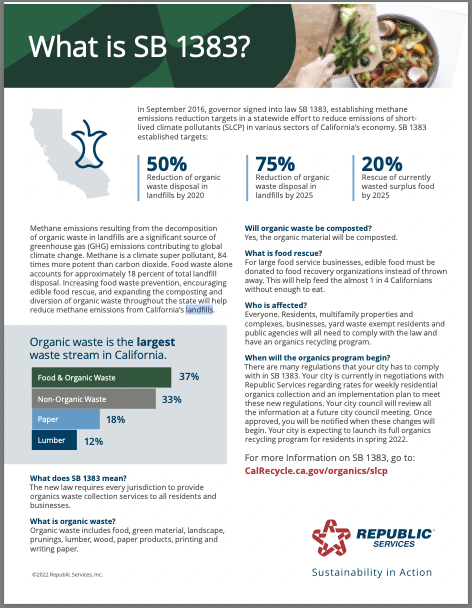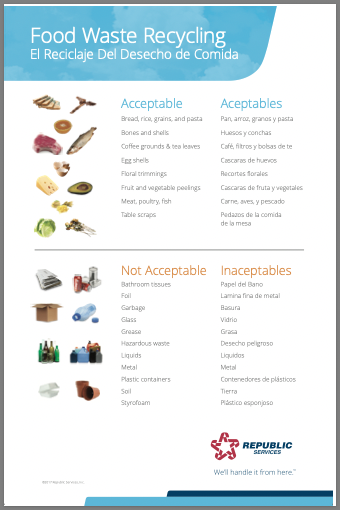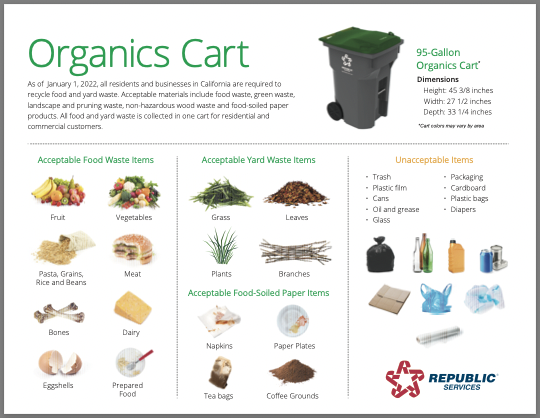Organic Recycling is here!
Get a free kitchen pail for your organic waste
You can now place food waste, food-soiled paper, with your green waste – grass, leaves, and prunings in the Organics Cart. It's the same material, just being placed a different cart. This change will help reduce the production of greenhouse gasses that cause climate change and reduce waste going to landfills.
State law requires all of California to separate their organic waste, such as food waste and food soiled paper, from their garbage that would otherwise go to the landfill. Learn more about Senate Bill 1383
What Is Organic Waste?
Organic Waste refers to waste that can go in the Organics Cart including food waste and yard waste. View acceptable and unacceptable items.
Examples:
- Food Waste, Coffee Grounds, Tea Bags
- Food-Soiled Paper Products
- Pizza Boxes, Napkins, Coffee Filters,
- Egg and Paper Cartons, To-go Bags and Boxes
- (no Styrofoam or Plastic)
- Green Waste
- Landscape and Pruning, Leaves, Flowers, Sludge
- Lumber, Wood
Benefits of Organics Recycling
Organic waste is the largest source of waste in landfills and leads to increased emission of methane and other greenhouse gasses. Proper organic waste recycling is an eco-friendly practice that makes a global and local difference. It has a big impact on the health of the environment and our communities.

Reduced Pollution
Composting organic waste instead of sending it to landfills will significantly reduce methane emissions, which contribute to climate change.

Renewable Energy
New state-of-the-art facilities in our state are turning organic waste into renewable natural gas used for transportation fuel, electricity and heating appliances.
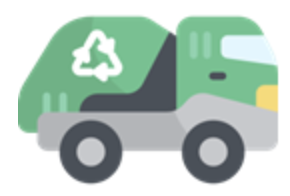
Less Landfills
Organic waste currently makes up half of what Californians dump in landfills. Diverting it to composting facilities will extend the life of landfill and minimize the need for more landfills in the future.

Resilient Agriculture
Compost created from organic waste will be applied to crops to enrich our soils and support a resilient food supply.

Combat Food Insecurity
Restaurants are required to donate edible food under Senate Bill 1383. Food donations can play a major role in helping distribute resources to families in our community experiencing food insecurity.
Who Needs to Take Action?
Everyone! All residents and businesses in Elk Grove are responsible for recycling organic waste.
Keep reading to learn about resident responsibilities.
Are you a business owner?
Learn about organics recycling at your business.
What are the new resident responsibilities?
Do your part to keep the City of Elk Grove green. Below are the actionable steps you’ll need to take to comply with new recycling requirements in the City of Elk Grove:
Single-Family and Multi-Family Residences
- Collect food waste and food-soiled paper products separately from trash in your home
- Dispose of food waste and food-soiled paper products in your green organic waste cart
- Bagging organic waste is optional. If you do want to bag organic waste, you must use BPI Certified Compostable bags! Look for the BPI Certified Symbol when shopping
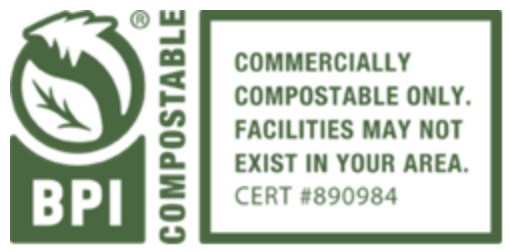
Multi-Family Property Managers
- Educate tenants and employees on organics recycling requirements annually and upon move-in
- Monitor bins for contamination
What Goes in the Organics Cart?
Acceptable
Dirty Paper
- Greasy pizza boxes and paper bags
- Paper coffee filters
- Food soiled paper napkins, tissues, and paper towels
Food scraps
- All fruits and vegetables (pits and shells too)
- Coffee grounds
- Dairy products (no liquids)
- Eggshells and eggs
- Leftovers and spoiled food
- Meat (including bones)
- Seafood (including shellfish)
Plants
- House plants
- All plant debris including flowers, leaves, weeds, and branches
- Tree trimmings (less than 6” in diameter and 4’ long)
Other
- Bags labeled “Compostable” only
- Cooking grease: Small amounts can be soaked up with a paper towel and composted.
- Corks (no plastic)
- Plastic clearly labeled “Compostable”
Unacceptable Items
Place these in your Blue Recycling Bin instead:
- Aluminum foil or trays
- Glass bottles and jars
- Metal cans and lids
- Plastic not labeled “Compostable”
- Recyclable/clean cardboard or paper
Place these items in your Black Landfill Bin:
- Composite items made of multiple materials
- Juice, soup, or soy milk type boxes with foil/plastic liner
- Styrofoam meat trays or other dirty Styrofoam
These items don’t belong in your green or blue bins but should still be recycled:
- Batteries: small residential quantities can be recycled
- Cooking oil: take to Special Waste Collection Center
- Electronics: contact Republic Services or take to Special Waste Collection Center
- Hangers: take to your local garment cleaner for reuse
- Plastic bags and film: recycle clean plastic bags at California supermarkets
- Styrofoam: take packing peanuts to local shipping store for reuse
Here’s a handy guide for easy reference in the future.
For more in depth information about specific products, please refer to the Republic Services web page.
Download and Print this Information
Countertop Kitchen Pails
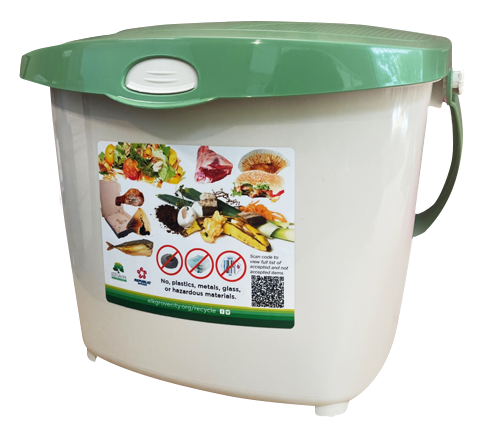 Kitchen pails are now available for pick up on Sundays through Wednesdays at the Special Waste Collection Center, open 9:00am to 4:00pm.
Kitchen pails are now available for pick up on Sundays through Wednesdays at the Special Waste Collection Center, open 9:00am to 4:00pm.
Having a kitchen pail makes it easy to collect your food waste in your home by scraping plates and placing your food scraps and food-soiled paper items into any pail of your choosing. Empty the food waste from the pail into your Organics Waste cart as often as you prefer.
Kitchen pails can be lined with a paper bag, napkins, or other compostable paper. While not required, you may use BPI Certified compostable bags to dispose of your organic waste. BPI stands for Biodegradable Products institute. These certified bags can be found online or at all major retailers.
The kitchen pails are grant funded by Cal Recycle and are of a limited supply. These pails are only available to Elk Grove Residents and are limited to one per household. Alternatives to using this pail include using bowls, cartons, and other household containers.
Frequently Asked Questions
What happens to the organic waste after it’s collected from residents and businesses?
The organic waste collected from residents is transferred to a local facility for sorting. From there, it is sent for processing to a California composting facility. Business’s organic waste is collected and transferred to an anaerobic digestion facility to produce renewable natural gas for transportation fuel, electricity, or heating appliances, or to a biomass conversion facility to produce electricity.
Can we use the same plastic bin liner we use for trash?
You aren’t required to bag your organic waste. However, if you’d like to, you may use BPI (Biodegradable Products Institute) Certified compostable bags or paper bags to dispose of your organic waste. Conventional plastic trash bags are not allowed since they cannot be processed at the organics recycling facilities. BPI Certified compostable bags can be found online or at all major retailers, just look for the Certification!
How often is my organic to be picked up?
The Organic Waste Cart will be collected on a weekly basis alongside your Garbage Cart. Your Recycling Cart will remain bi-weekly.
Why are we required to separate organics?
The State of California passed Senate Bill 1383 as a statewide effort to reduce emissions of short-lived climate pollutants and help prevent global climate change. It requires all California residents and businesses to separate their organic waste, including food waste and yard waste, from trash so that it can be recycled rather than disposed of in a landfill. Organic materials such as food waste and paper decompose anaerobically (without oxygen) in a landfill, producing methane—one of the most potent greenhouse gases in Earth’s atmosphere. By separating and recycling our organic waste, Californians will be diverting around 300,000 tons of food waste per year from landfills.
How do I separate my food waste?
The easiest way to recycle your food waste is to keep a bowl or other container close by when cooking. Place all your fruit and vegetable trimmings, peels, stems, meat scraps, eggshells, etc. in the bowl as you go. When you’re done eating, scrape all your unwanted leftovers into the bowl and transfer it all to the organics cart outside. If you prefer to keep a closed kitchen countertop pail in your kitchen, the City is providing free pails while supplies last. The pails are washable and dishwasher safe.
What about the smell? Will this attract pests or bugs?
Remember that this material is already in your trash cart, so no new issues should arise. Your organics cart is collected weekly to minimize the risk of attracting pests or bugs. While not required you can place your food waste in paper bag, napkins, or other compostable paper. While not required, you may use BPI Certified compostable bags to dispose of your organic waste. BPI stands for Biodegradable Products institute. These certified plastic bags can be found online or at all major retailers.
What if I already have a compost bin at home? Can I be excluded from this?
No, unfortunately the state law requires mandatory compliance. On the plus side, there are many waste types that should not go into a home composting bin but can be composted through this program including meat, grains, packaged and processed food, and food-soiled paper such as dirty paper napkins. Whatever you do, remember that food waste no longer belongs in the trash as of July 1, 2022 and that disposing of food waste in the trash may result in Contamination Fees and/or fines.
What if I refuse to separate my food waste?
The state has made these requirements mandatory and the City has been mandated to enforce them. Noncompliance, which includes refusing to recycling your organic waste and/or not placing the correct materials in each cart, could lead to code violations. If the City does not enforce these requirements, the City could be subject to administrative penalties of up to $10,000 per day.


